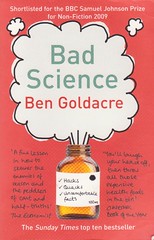 Image by EadaoinFlynn via Flickr"Bad Science" is a modern classic of scientific sceptical movement. Its importance and influence easily rank it alongside the defining works of Carl Sagan, Martin Gardener, James Randi, Michael Shermer, David Aaronvitch, Christopher Hitchens, Richard Dawkins, Carol Tavris, Paul Kurtz, Sam Harris and Phil Plait. My rather unscientific mind put it on my "to read" list for way too long. As I learnt more about the scientific method and critical thinking from subjects I was more comfortable with like history or the social sciences, I slowly made my way to Goldacre's book with trepidation.
Image by EadaoinFlynn via Flickr"Bad Science" is a modern classic of scientific sceptical movement. Its importance and influence easily rank it alongside the defining works of Carl Sagan, Martin Gardener, James Randi, Michael Shermer, David Aaronvitch, Christopher Hitchens, Richard Dawkins, Carol Tavris, Paul Kurtz, Sam Harris and Phil Plait. My rather unscientific mind put it on my "to read" list for way too long. As I learnt more about the scientific method and critical thinking from subjects I was more comfortable with like history or the social sciences, I slowly made my way to Goldacre's book with trepidation. As it turns out, and according to Goldacre, this is the problem. The general public are confused by science and therefore untrusting of it, which makes them more susceptible to pseudoscience, quackery and manipulation on a grand scale. Whether it is buying ineffective "natural" cures from nutritionist quacks to over-priced and under-tested drugs from devious pharmaceutical companies, Ben Goldacre fears that an ignorant public is being duped and the consequences can be catastrophic.
